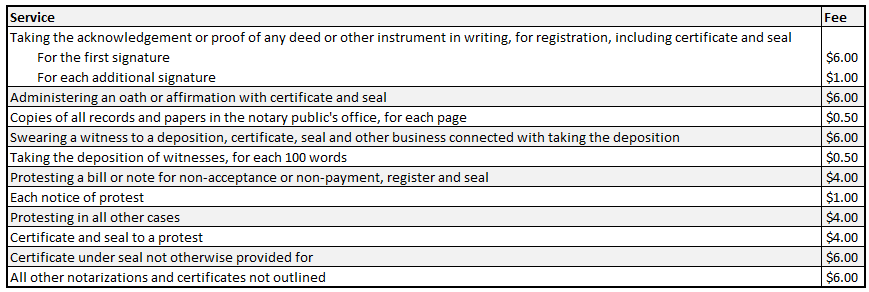Notary Acts
- Details
- Parent Category: Texas
- Category: Texas Notary FAQs
The following are the most common questions asked by our customers regarding notary acts. However, if your question is not listed below feel free to contact us to receive an answer to your question.
What's the difference between an oath and an acknowledgment?
How much can I charge for a notarization in Texas?
Are the fees I collect considered taxable income?
Do I have to keep a notary record book?
Can I notarize for a family member?
Can I notarize my own signature?
Can a Texas notary perform a marriage ceremony?
What's the difference between an oath and an acknowledgment?
With an Oath, the affiant is swearing to the content of a document. With an Acknowledgment, the affiant is acknowledging that he/she did sign the document.
How much can I charge for a notarization in Texas?
The following chart shows the maximum fees you may charge for notary public services. A notary who charges more than the maximum fees is subject to possible criminal prosecution and suspension or revocation of the notary's commission by the Secretary of State's office.

Are the fees I collect considered taxable income?
Yes. The best way to keep track of the Texas notary fees you have collected is by recording them in your required notary record book. Additionally, you may want to check with your tax professional about including notary fees as income.
Do I have to keep a notary record book?
Yes. Texas notary law does require that all Texas notaries keep a record book. Texas notary law also requires the record book meet certain standards. The notary record book sold by Budget Notary Bonding Agency meets all Texas notary law requirements. Remember to fill out each entry in its entirety every time you notarize. Remember also, the notary record book is a public record. If the notary public is unable to keep these records due to death, removal, or resignation, the records must be submitted to the appropriate County Clerk's office.
Can I notarize for a family member?
Texas law does not restrict you from notarizing for family. However, because a Texas notary public should be an impartial witness, we strongly recommend you do not notarize for any family member.
Can I notarize my own signature?
No. This is not allowed under Texas notary law.
Can a Texas notary perform a marriage ceremony?
No. Some states allow notaries to perform marriage ceremonies, however, Texas is not one of them.
Can I refuse to notarize?
Yes. If all of the requirements to perform a proper notarization have not been met, or if you question the signer's competence, or suspect he/she is being coerced, you should refuse to notarize. Also, if you are uncomfortable with what you are being asked to do, you can refuse. For example, you may be unwilling to notarize a will because of liability concerns. Additionally, there may be limitations set by your employer during office hours. If you are notarizing as part of your job, employers are within their rights to impose limitations. Keep in mind, your employer shares your liability if you are notarizing in the scope of your employment.
